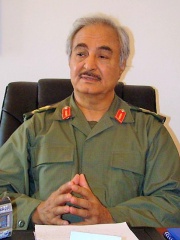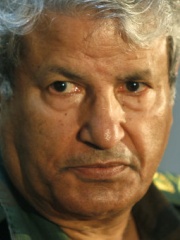


The Most Famous
MILITARY PERSONNELS from Libya
This page contains a list of the greatest Libyan Military Personnels. The pantheon dataset contains 2,058 Military Personnels, 3 of which were born in Libya. This makes Libya the birth place of the 63rd most number of Military Personnels behind Kyrgyzstan, and Uzbekistan.
Top 3
The following people are considered by Pantheon to be the most legendary Libyan Military Personnels of all time. This list of famous Libyan Military Personnels is sorted by HPI (Historical Popularity Index), a metric that aggregates information on a biography's online popularity.

1. Khalifa Haftar (b. 1943)
With an HPI of 72.98, Khalifa Haftar is the most famous Libyan Military Personnel. His biography has been translated into 42 different languages on wikipedia.
Khalifa Haftar (Arabic: خليفة حفتر, romanized: Ḵalīfa Ḥaftar; born 7 November 1943) is a Libyan-American politician, military officer, and the commander of the Tobruk-based Libyan National Army (LNA). In 2015, he was appointed commander of the armed forces loyal to the elected legislative body, the Libyan House of Representatives. He has been the de facto ruler of the eastern part of Libya since 2017, governing the region as a military dictatorship under the LNA. Haftar was born in Ajdabiya. He served in the Libyan Army under Muammar Gaddafi, and took part in the coup that brought Gaddafi to power in 1969. He participated in the Libyan contingent against Israel in the Yom Kippur War of 1973. Haftar then participated in the Chadian-Libyan war (1978–1987), becoming promoted to Chief officer of the Libyan military in Chad in 1986 until he was captured by Chadian forces in 1987 and held as a prisoner of war, which was seen as a major embarrassment for Gaddafi and represented a major blow to Gaddafi's ambitions in Chad. While being held prisoner, he and his fellow officers formed a group hoping to overthrow Gaddafi. He was released around 1990 in a deal with the United States government and spent nearly two decades living in the U.S. in Langley, Virginia, and gained U.S. citizenship. In 1993, while living in the United States, he was convicted in absentia in Libya, of crimes against the Great Socialist People's Libyan Arab Jamahiriya, and sentenced to death. Haftar held a senior position in the forces that overthrew Gaddafi in 2011, during the First Libyan Civil War. In 2014, he was commander of the Libyan Army when the General National Congress (GNC) refused to give up power. Haftar launched a campaign against the GNC and its Islamic fundamentalist allies. His campaign allowed elections to replace the GNC but then developed into the Second Libyan Civil War. In 2017, Ramzi al-Shaeri, vice-president of the Derna city council and lawyers Ryan Goodman and Alex Whiting accused Haftar of the war crime of ordering the killing of prisoners of war during the recapture of Derna. Haftar has been described as "Libya's most potent warlord", having fought "with and against nearly every significant faction" in Libya's conflicts, as having a "reputation for unrivalled military experience" and as governing "with an iron fist". In November 2021, Haftar announced his candidacy for the presidential election in December 2021 before it was postponed. Although Haftar is reportedly an anti-Islamist, his allies include the Salafi Madkhali militias for geopolitical purposes. Besides his native Arabic, Haftar also speaks English, Italian and Russian, and some French. He is a dual Libyan-US citizen. He is expected to renounce his US citizenship before the next Libyan election.

2. Abdul Fatah Younis (1944 - 2011)
With an HPI of 61.73, Abdul Fatah Younis is the 2nd most famous Libyan Military Personnel. His biography has been translated into 23 different languages.
Abdul Fatah Younis Al-Obeidi ( ; Arabic: عبد الفتاح يونس, sometimes transliterated Fattah Younis or Fattah Younes or Fatah Younes; 1944 – 28 July 2011) was a Libyan military officer and politician. He served as Libya's interior minister until his resignation on 22 February 2011 when he defected to the rebel side in the First Libyan Civil War. He was considered a key supporter of Muammar Gaddafi and even No. 2 in the Libyan government. Following his resignation and defection, he urged that the Libyan Army should "join the people and respond to their legitimate demands". In an interview with John Simpson on 25 February, he said he believed Gaddafi would fight to the death, or commit suicide. On 29 July 2011, Younis was reported dead by Libya's National Transitional Council (NTC) in unclear circumstances. According to the NTC's oil minister, Ali Tarhouni, Younis was killed by members of an anti-Gaddafi rebel group and the Libyan government stated that he had been killed by the rebels who suspected he was a double agent.

3. Abu Anas al-Libi (1964 - 2015)
With an HPI of 51.99, Abu Anas al-Libi is the 3rd most famous Libyan Military Personnel. His biography has been translated into 17 different languages.
Nazih Abdul-Hamed Nabih al-Ruqai'i, known by the alias Abu Anas al-Libi ( AH-boo AH-nahs ahl LEE-bee; Arabic: ابو أنس الليبي Libyan pronunciation: [ˈæbu ˈʔænæs əlˈliːbi]; 1964 – 2 January 2015), was a Libyan under indictment in the United States for his part in the 1998 United States embassy bombings. He worked as a computer specialist for al-Qaeda. He was an ethnic Libyan, born in Tripoli. His aliases in the indictment are Nazih al Raghie and Anas al Sebai. In the FBI and United States State Department wanted posters, another variant of his name is transliterated Nazih Abdul Hamed Al-Raghie. The indictment accused al-Libi of surveillance of potential British, French, and Israeli targets in Nairobi, in addition to the American embassy in that city, as part of a conspiracy by al-Qaeda and Egyptian Islamic Jihad.
People
Pantheon has 3 people classified as Libyan military personnels born between 1943 and 1964. Of these 3, 1 (33.33%) of them are still alive today. The most famous living Libyan military personnels include Khalifa Haftar. The most famous deceased Libyan military personnels include Abdul Fatah Younis, and Abu Anas al-Libi.

